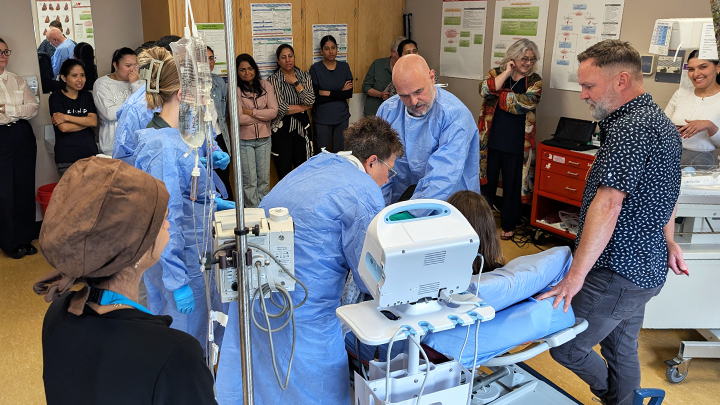
October 31, 2025

The Rural Surgical and Obstetrical Networks of Alberta led a birth event in Vegreville, where a live simulated patient wore a birthing simulator. Supplied.
Story by Kathleen Deman
An innovative initiative is reshaping how rural care teams learn, collaborate and grow.
In rural Alberta, healthcare providers are committed to delivering safe, high-quality care even as they navigate geographic remoteness, constrained resources and limited access to traditional training.
Helping them to overcome these challenges are the Rural Surgical and Obstetrical Networks of Alberta (RSONA), which align training and education to meet the needs of rural physicians and the obstetrical workforce.
As one of their foundation pillars, RSONA brings specialists directly to rural sites — not just to teach, but to collaborate. These simulation events aren’t one-size-fits-all. Instead, RSONA works closely with site leadership to design and tailor these events to the unique challenges of each location.
"Bringing specialists to rural sites is what makes RSONA stand out," says Sue Higgins, program manager, RSONA. "We are breaking down barriers and feelings of isolation to building communities and corridors of care."
Earlier this year, Brooks Health Centre hosted the first of these simulation events. The successful outcome prompted RSONA to broaden its support of rural sites including two Covenant Health sites: the St. Joseph’s General Hospital in Vegreville and the Bonnyville Health Centre.
Although the Emergency Department (ED) in Vegreville is not a designated birthing centre, several births have occurred there. This prompted physicians and staff to seek support in current birthing practices. They raised their concerns with site management, who then reached out to RSONA for assistance.
"It’s important that the clinical staff feel comfortable to support all and any patient(s) who may arrive," says Lindsay Rypien, site manager, Vegreville. "RSONA encouraged our staff to build confidence in their skills and ask questions in a safe and welcoming environment."
RSONA coordinated a tailored simulation event focused on cephalic birth and shoulder dystocia (where a baby's shoulder becomes stuck during a vaginal delivery.).
The simulation took place in an onsite classroom using a birthing simulator worn by a live simulated patient, which was provided by the Covenant Health simulation team. Being able to practice in a familiar environment and using their own equipment, promoted familiarity, realism and a safe space to for staff to prepare to work together in high-pressure situations.
"As a nurse working in a rural setting where we rarely see deliveries, this simulation was incredibly valuable," says Sydney Giebelhaus, registered nurse and participant. "It gave us an opportunity to refresh our skills, while building confidence and working as a team in a scenario we don't often encounter."
"Having hands-on practice in a realistic environment helped us to identify gaps and better prepare us for future situations in a supportive and safe way."
In Bonnyville, RSONA hosted a full-day simulation event modeled after the one in Brooks. The Bonnyville site selected a fire in the operating room (OR) and a postpartum hemorrhage (PPH) as their two simulation scenarios, as they best aligned with their current learning needs. The event allowed clinicians to work through the scenarios as a team, strengthening their communication, decision-making and technical skills.
"The hands-on training, in our own environment was invaluable," says Connie Fortier, assistant head nurse, OR Bonnyville. "The PPH simulation brought both the OR and obstetrics teams together and, because of this, we have moved forward on other training projects. The fire in the OR simulation is something we talk about, but to actually see 'smoke' during the simulation made it that much more real."
These events showcase the power of collaboration among rural healthcare teams, and promote shared learning and enhance services for rural patients. By bringing simulation training directly to rural sites, clinicians gain access to high-quality, hands-on learning tailored to their realities.
"Rural teams are often close-knit teams that feel like a family," says Rana Sleiman, provincial implementation lead, RSONA. "RSONA brings in resources that reinforces what they already know to take their patient care to a new level."
RSONA will head to Peace River later this fall to conduct similar simulation events, with a focus on PPH. They will also be meeting with teams in Hinton and High Level to determine how RSONA can help them.
"It was amazing having RSONA come out to our rural site to do these simulations," adds Fortier. "I look forward to more opportunities to collaborate with RSONA."